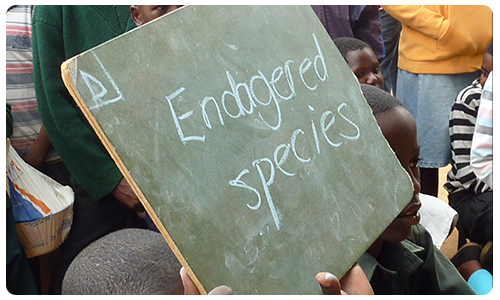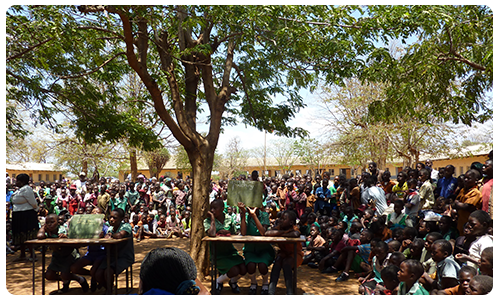Inspiring the Next Generation of Rhino Conservationists


In order to ensure the survival of rhinos, it is important to not only think of what we can do to help them in the present but also what can be done to ensure their future. IRF works with multiple partners across rhino range states to engage the local community in conservation efforts and facilitate their efforts to become active partners in wildlife protection. One such program is run by our on-the-ground partners in Zimbabwe, the Lowveld Rhino Trust (LRT), who work with 55 primary schools surrounding the Bubye Valley Conservancy, home to populations of both white and black rhinos in Zimbabwe.
LRT’s program, funded by IRF and other donors, provides educational materials and information to reinforce the understanding of rhinos and their conservation needs. The program consists of awareness and outreach visits to the schools. The activities they facilitate include showings of a Shona-language film about rhinos, and quiz competitions for Grades 4 and 5 on rhino conservation and general environmental issues linked to the relevant curricula. Prizes and incentives are offered to engage the students in participation, including textbooks and exercise books based on quiz performance.
In order to further incentivise the students, schools and communities, additional educational incentives are donated based on the rate of rhino population growth in the neighboring conservancy. A baseline level of support of $25,000 per year is spread over this area to which additional bonuses are added for every percentage of annual rhino population growth. The goal of this is to create a beneficial relationship between schools and students and rhinos. The more rhinos thrive in BVC, the more funds are given to support education to these students and communities and further reinforce their understanding of rhinos and their conservation needs.

“Unless rhinos are seen as having value to these communities, they will have little reason to help protect them or accept that rhinos need land to live on as well,” said Raoul du Toit, Director of the LRT.
In 2022, LRT continued to incentivize local communities to support rhino conservation by providing 33,000 exercise books, 1,750 textbooks, 300 t-shirts and $3,500 worth of building materials to help repair the schools. LRT staff led 47 “edutainment” shows and choral competitions with rhino themes incorporated, reaching 265 adults and 3,850 children.
The program has proven extremely popular, with school officials noting on a recent visit that the quiz competitions are now a very important and anticipated event on the school calendar. By inspiring and educating these students we hope to ensure that the future generations of both Zimbabwe’s people and wildlife thrive.
